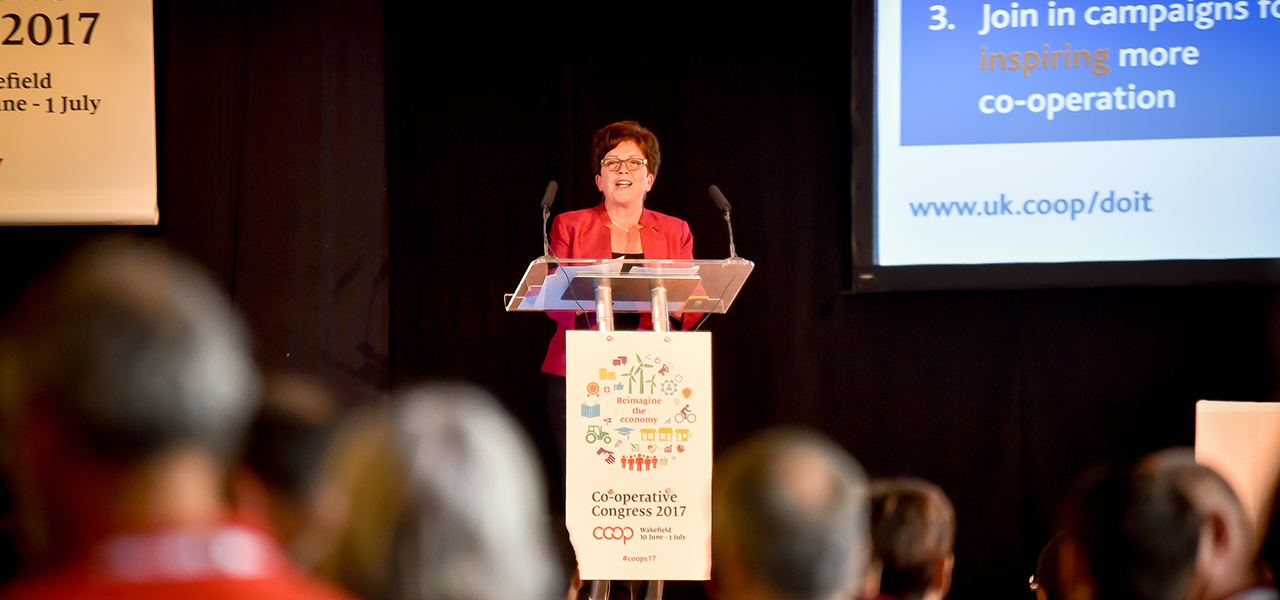The co-operative business model is participatory, relevant and resilient. Those working for and with co-ops generally agree that there should be more of them – but also agree that public understanding and professional knowledge of the co-operative option is woefully inadequate and largely confined to food shops and funeral providers.
On 1 July 2017 – the International Day of Co-operatives – the National Co-operative Development Strategy (NCDS) was launched to help tackle this. Led by Co-operatives UK, the strategy was drawn up after two years of dialogue with the movement (with input and ideas from more than 550 co-ops), using studies of other countries with strong co-op sectors. It was called Do It Ourselves and was radical in its outlook, with plans to reshape the country’s economy on more participative lines.
At its launch at Congress in Wakefield, Dame Pauline Green, former president of the International Co-operative Alliance, called it “fresh, simple and stimulating strategy … a call to action, based on our co-op roots, to actually do it ourselves”.
It had some lofty ideas. By 2027, it aimed for a 50% increase in public perception of co-ops as modern and innovative; backing from major professional associations for the co-operative option; a tripling of the rate of co-op start-ups and conversions; and evidence in place of positive social and environmental impact. By 2037, it wanted half of the UK population to benefit from co-operative or mutual enterprises as a member; and for £1 in every £10 of the country’s GDP to be generated by participative businesses such as a co-op or mutual.

It had three points of focus for co-operative development: freelancers; social care; and platform co-ops. And it asked co-operators to do three things: commit to be great at co-operation; be willing to be open to new co-operation; and join in campaigns for inspiring co-operation. Co-operatives UK issued a pack to introduce the strategy, designed and printed by Calverts workers co-operative, with a booklet and 35 information cards.
Related: Reports from Co-operative Congress 2019
Two years on, Co-operatives UK is undertaking a review of how the strategy is working, with a report planned for later in the year. The review asks if the sectors in focus are the right ones, and what else should be taken into account when looking at other more long-standing co-op sectors, which often have their own federal networks. Because while there have been some significant success stories, there is a long way to go to reach the original aims – and the uncertain political and economic environment presents additional challenges.
The successes
Co-operatives UK has encouraged co-op development through the Hive, which will have supported over 1,200 groups by the end of 2020. And there have been some significant successes in the different sectors championed by the NCDS.
For freelancers, it helped IndyCube (which supports freelancers and the self-employed) to convert to a co-op, advised on the set-up of the Contractor Co-op and produced the Organisers’ Guide with the TUC and Co-op College. It is also in the process of backing efforts to pilot Dutch-style Bread Funds and will soon be launching a digital co-op formation tool for freelancers.
In the social care sector, it supported the formation of care co-op consortia in Wales and England, assisted the development of health and social care organisation Choices4Doncaster, funded early work to get the Equal Care Co-op established, and is influencing national policy on social care delivery.
In terms of new digital ventures (platform co-ops), it co-ran UnFound (the world’s first accelerator for platform co-ops), published research on innovative finance models, advised the ICA on global action for platform co-ops and, from mid-2019, is funding a new unit to promote platform co-ops.
The challenges
The National Co-operative Development Strategy was owned by the movement, and although used effectively by Co-operatives UK itself, at first glance it hasn’t been taken up particularly widely.

But Ed Mayo, Co-operatives UK’s secretary general, believes that one of the core achievements of the NCDS has been helping to bring new partners into the co-operative sector, such as the innovation foundation NESTA, which supported work around platform co-ops. Another has been how it has informed and prompted work by and on behalf of the Co-operative Party on the policy agenda for growing the sector. “We need both – bottom up and top down approaches,” says Mr Mayo. “All of the research and data collected for the strategy was used to shape the most exciting policy agenda and options for co-ops at a political level for years.”
However, he acknowledges that one thing it hasn’t done is solve the resource challenge faced by many of the specialist co-op development practitioners. “Their expertise is vital and at risk. This has to be a focus for action and for innovation looking forward.”
The strategy has also come up against a series of challenges and risks that limit the capacity for co-op development. The economic context, including the response to Brexit, has been challenging, resulting in low margins for many co-ops. In turn, resources everywhere are tight, with initiatives (including The Hive) run on a short-term basis. And co-op start ups have been lower than expected (191 annually), despite a rising number of co-op members (13.1 million).
The mission of Co-operatives UK is to promote, develop and unite co-operative enterprise – so while it is natural for it to play a role in facilitating the strategy, says Mr Mayo, “the only way the organisation can make a difference is by working with its diverse members”.
He adds: “That diversity does matter. Co-operative development is not just a code for asking for funding from the larger consumer co-ops. That’s not enough now. We have to engage the larger co-op businesses on their terms and in line with their desire to be successful as co-operatives.
“All that we do is with our members. It is inconceivable, for example, that we could have seen the advances around student housing co-ops without the supportive investment of some of the consumer co-ops, or without the inspired efforts of members of student housing co-ops themselves. Co-operatives UK acts as a catalyst and, when we succeed, it is typically the wider movement that should take the credit.”
The future
So does the NCDS have a future? “The UK is one of the only countries worldwide to have a practical and participative strategy for growing the
co-operative sector,” says Mr Mayo. “What the UK is doing is seen as a genuine mark of progress. We are reviewing the strategy precisely because we need to understand how to improve what we have. To go back to having no strategy would be to turn back towards a dismal cold comfort zone in which specialists argue with each other and co-ops don’t have to co-operate with each other.”
He believes that an organised approach to co-operative development “acts like yeast in the right conditions”, and gives the example of the Marcora Law in Italy, where funds raised from co-ops in lieu of tax payments to go into co-operative development. “Why can’t we, in time, have that here? In Italy too, the social co-op movement has spread through a ‘strawberry patch’ model of fledgling co-ops supported by another in turn supporting a new co-op when they are up and ready. A collective strategy is an investment in a future co-operative economy.
“They say that democracy is the art of having a conversation across society. We won’t always agree, but with co-ops, we need to encourage a conversation across the co-operative movement and our many partners and allies, based on our values of honesty and openness, so that we have more of a shared understanding of what success can look like. No strategy is a substitute for action, but done well, it can be a spur to it.”